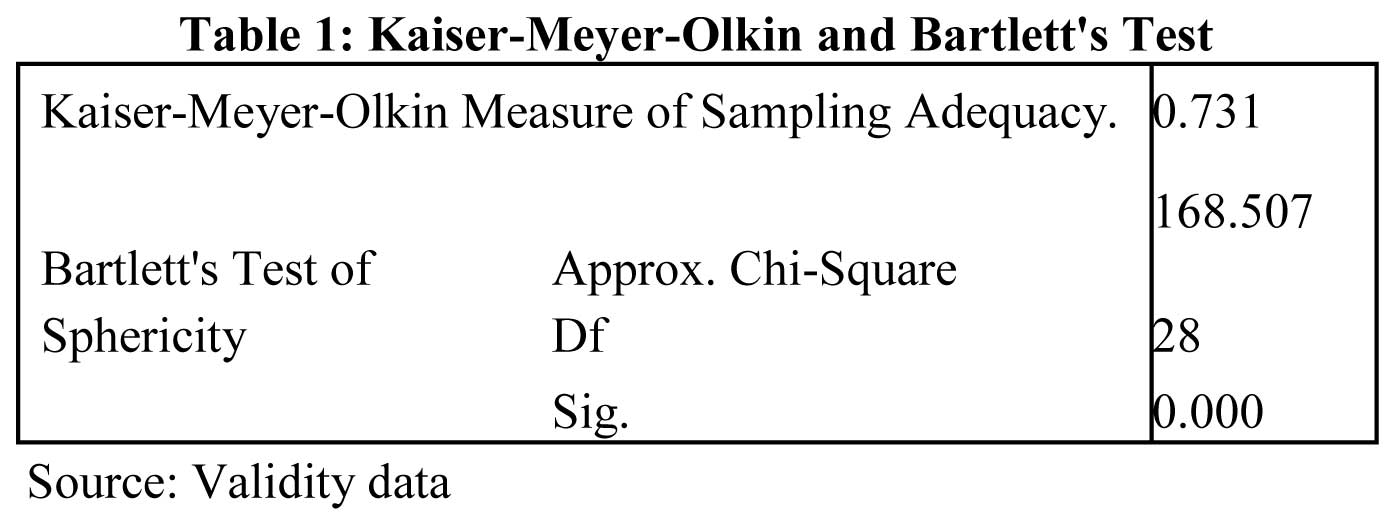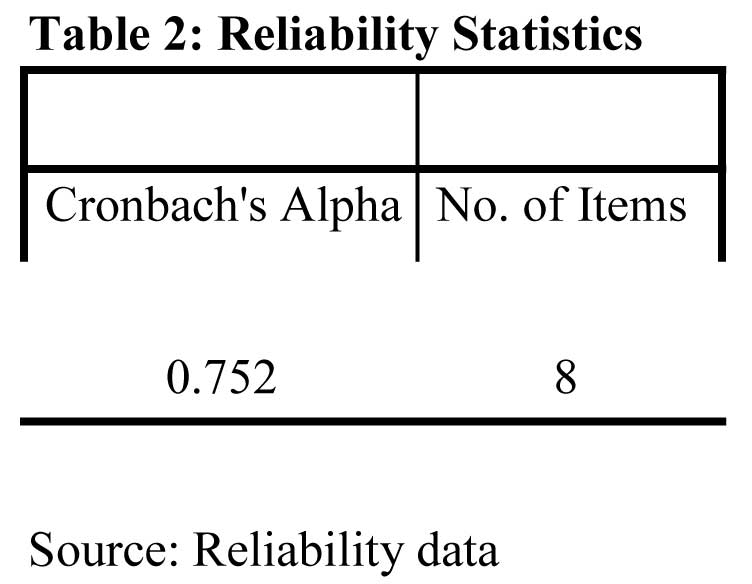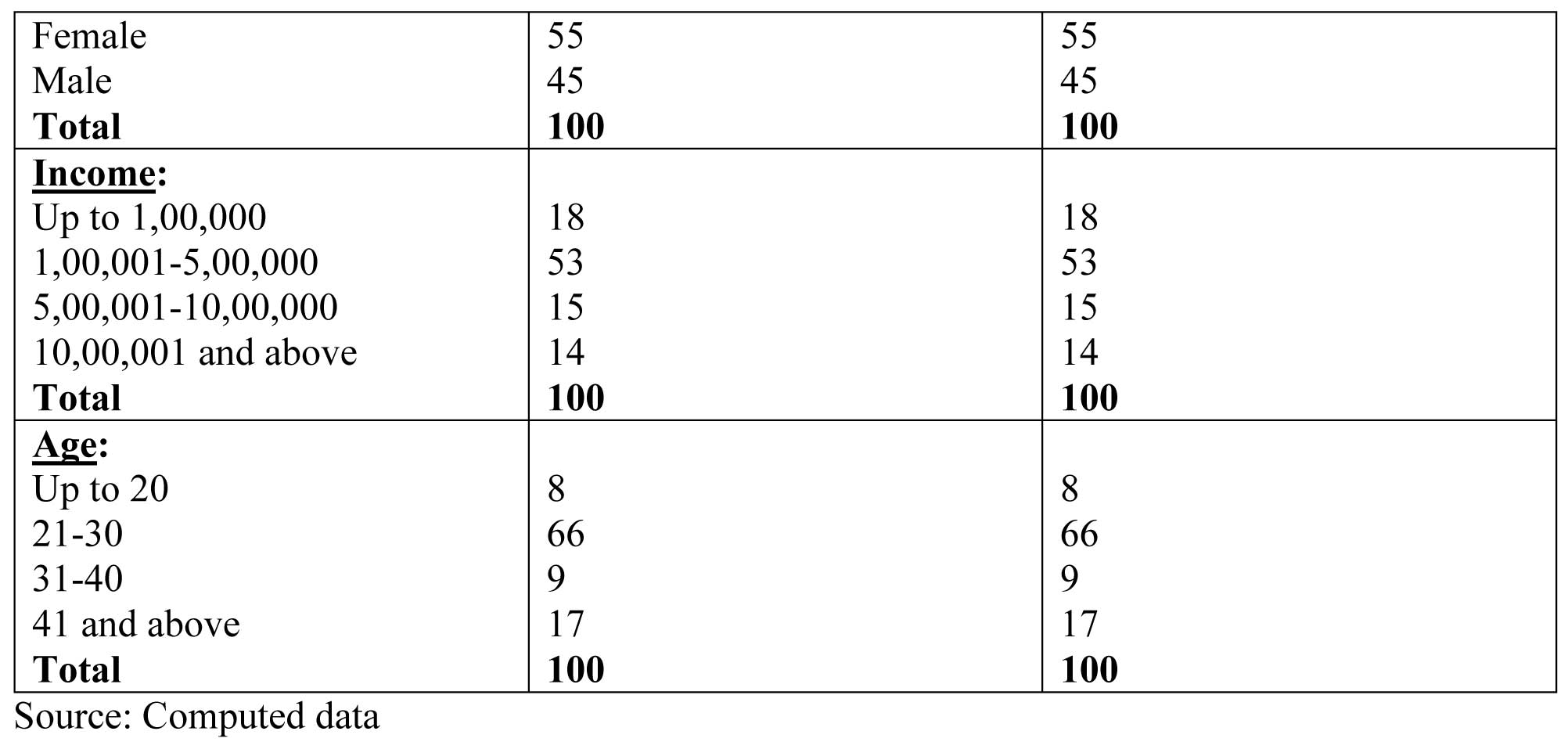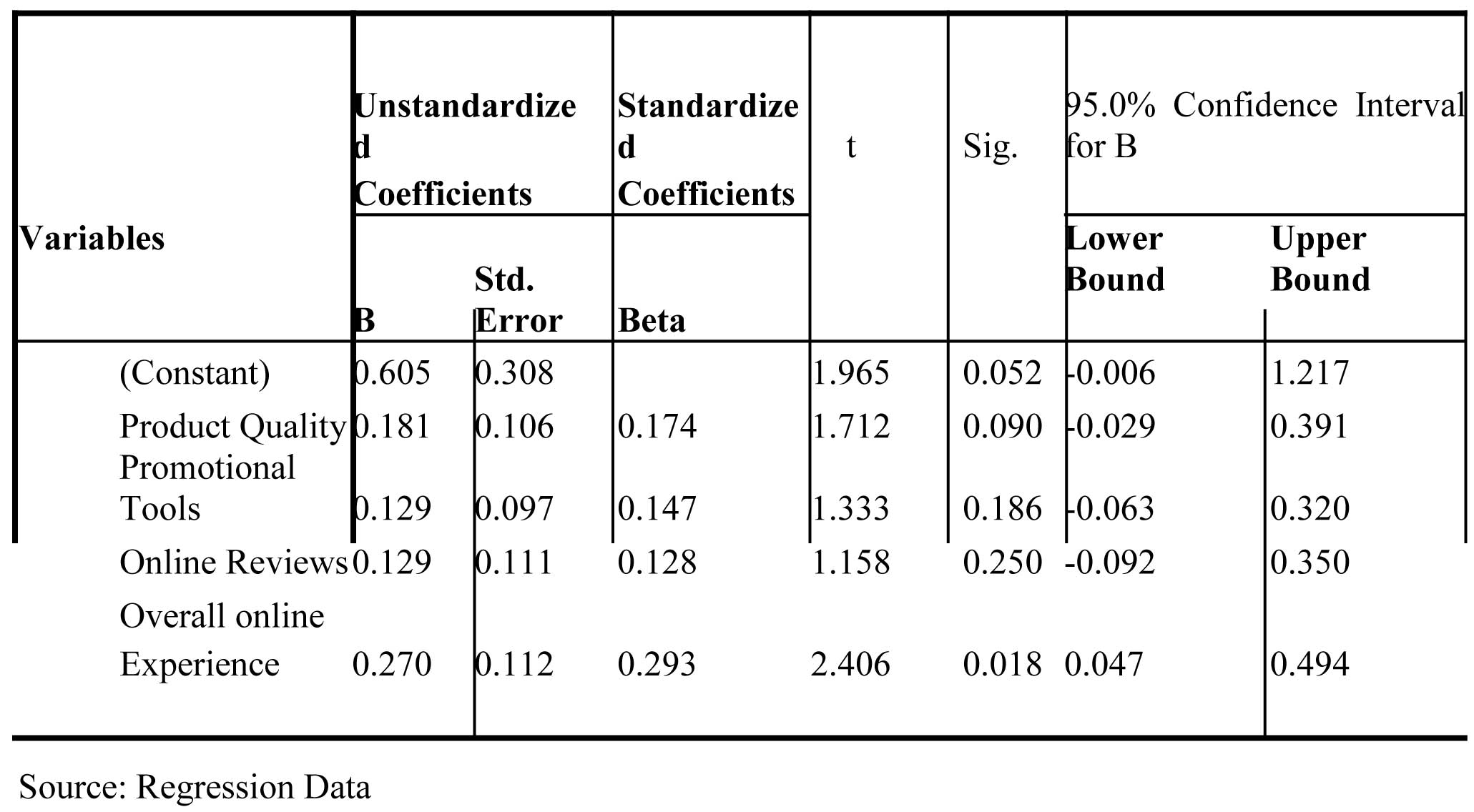Subscribe now to get notified about IU Jharkhand journal updates!
Effect of Online Customer Feedback System on Marketing of Indian Retail Industry
Abstract :
In today’s fast-changing world, online customer feedback is a prerequisite for marketers and brand owners to design the latest products instantly. Online customers are always eager to know whether marketers and brand owners really improving or re-designing their products according to online customer responses. This study is to examine the effect of online customer feedback system for service quality improvement in time-bound manner and improvement in goods also in Indian retail market. Some relevant grounds (product quality, the reach of promotional tools, online reviews and overall online experience of customers) are undertaken to evaluate the effect of online customer feedback on marketers in the retail industry. The finding reveals that the overall online experience of customers highly influences the effect of online customer feedback system for marketers in the retail industry. Data reveals that female respondents having an annual income (between Rs. 1,00,001 and Rs. 5 lakhs) with an age group of 21 to 30 highly influences the online customer feedback system in Indian retail industry. The overall finding of this study provides implications for marketers and brand owners regarding online customer feedback system in the Indian retail industry.
Keywords :
online customer feedback, product quality, promotional tools, online reviews, online experience.Introduction:-
Understanding the purchase intentions of an online customer is a prior one for marketers competing in the fast-expanding marketplace. Marketers are always ready to undertake online customer feedback process because of the various benefits it provides to them that it is easy to communicate with customers, better control, and competitive advantage and last but not the least which is most important for every marketer is to provide improved customer service.
Feedback from customers has always been important when it comes to product, brand, and business model development. Online customer feedback is basically the information collected from online customers about their online experience. These feedback results provide organizations with deep insights into how customers are experiencing their website or online product, which digital marketers then analyze and use to adjust or improve their websites or mobile apps or to improve their product towards customers.
As online platforms are increasingly associated with various marketing plans and our everyday life, people use online tools instead of visiting physical stores or shops which saves a lot of time in our fast-changing lifestyle. Online feedback not only allows marketers to build uniquely tailored ongoing relationships with individual customers but it also saves time for customers to provide their responses through the online customer feedback process.
Recognizing the above situation, marketers are empowering their customers to provide feedback on the products or services offered on their websites and making the feedback available to other potential customers, which are more popular as online reviews. Such feedback systems allow marketers to rate each aspect of their product and analyze their faults which will be a reflection point on their performances. However, this study throws light on the effect of online customer feedback system on marketers or brand owners of the retail industry in the Indian market. Therefore, it is necessary to analyze the effect of online customer feedback process of retail industry in four main metro cities of India.
Review of literature
According to research (Schindler, R. M., and Bickart, B., 2005) [13], customers provide their responses through online customer feedback and the information contained in the feedback always affect their purchase decision making. It was seen that 62 % of the customers have looked at least once at online feedback before making a decision (Byrnes, N., 2007) [2]. As per The Economic Times, December 17, 2018 [18], the report revealed that consumers are more open to purchase packaged and fresh groceries online when they are offered certain purchasing options and quality assurances. It is evident from the research conducted by Bromage (2001) [1] that the last mile, including product transportation, is frequently considered the most important element of the order fulfillment process. For example, 89% of the online shoppers rate on-time delivery high in importance, second only to privacy issues (90%) (Yankelovich, 2000) [20]. In an online advertising context, firms benefit from greater recall, higher content evaluations, and more purchases (Tam and Ho, 2006) [15], such that personalized advertisements appear twice as effective as similar, impersonal versions (Tucker, 2014) [19]. The Economic Times, January 16, 2018 [17] According to a report on online advertising by Dentsu Aegis Network, the Indian digital advertising industry, currently pegged at around Rs 8,202 crore. Another research conducted by Tapscott, D. (2008) [16] revealed that with over 400 million registered users worldwide, Facebook is an important online meeting place for social networking. Users who propagate must perceive the benefit of use to their friends and relatives achieve network externalities, and positive feedback gives rise to larger expansion, which increases platform members (Powell, 2009) [12]. According to Nielsen’s (2011) [9] social media usage report, nearly 40 million Indian used online reviews to help them make informed purchase decisions, which accounts for 67% of Indian online. The study also revealed that Indians want to connect with different brands through social media.
A web site is perhaps the only way an online store communicates with its customers (Chen and Dhillon, 2003) [3]. Web site quality serves as the store atmosphere (E´ thier et al., 2006) [6] and accordingly is a trustworthiness cue (Corritore et al., 2003) [4], especially at the beginning of transactions (McKnight et al., 2004) [8]. Another research conducted by Pavlou and Gefen (2004) [10] that online escrow service providers (e.g., Paypal and SafeTrader) authorize payments only after the customer accepts the deal and agrees to pay, providing a secured internet service against several risks for the fulfillment of services.
Research Gap
Former research studies have established many concepts regarding the effect of the online customer feedback system in different areas such as in industries and marketing strategies as well as there are some research studies which focused on analyzing customer feedback in different sectors but not enough is known regarding the effect of online customer feedback system on marketers in Retail Industry. However, through this study, we would like to establish whether the online customer feedback process does have an effect on the activities of marketers in Indian retail industry.
Research Objectives
The main objective of this research is to study the effect of online customer feedback process on marketers in the retail industry in four main metro cities of India.
The above-stated objective can be achieved based on the following aspects:
- Quality of the product;
- Reach of promotional tools;
- Online reviews; and
- Overall online experience.
Formulation Of Hypotheses
Following hypotheses can be drawn to be tested through this research to assess the effect of online customer feedback system on marketers in Indian retail industry:
Quality of Product:
In trading environments, the condition usually translates to the need for sufficiently high-profit margins for “good quality” products so that the promise of future gains from sustaining a reputation is more convincing to predict or avoid short-term cheat. This was first pointed out in Klein and Leffler (1981) [7] and more formally explored in Shapiro (1983) [14].
Research Question 1:
Does views on product quality can be expressed to the marketers positively through an online customer feedback process?
Hypothesis 1:
Views on product quality can be expressed to the marketers positively through an online customer feedback process.

One example is social games; examples of supporting tools are photo sharing, message sharing, and video sharing; an example of social activities is fan pages, and an example of friend searching tools is e-mail. These services help to increase the actual availability of complementary products perceived by users and further enhance users’ continued intention to use (Powell, 2009 [12]; Tapscott, 2008 [16]).
Research Question 2a:
Does views on the online advertisement of a product can be expressed to the marketers positively through an online customer feedback process?
Hypothesis 2a:
Views on the online advertisement of a product can be expressed to the marketers positively through an online customer feedback process.
Research Question 2b:
Does social networking of a product improves positively based on online customer feedback process?
Hypothesis 2b:
Social networking of a product improves positively based on online customer feedback process.
Online reviews:
In a survey of 5,500 Web consumers conducted by Biz Rate, 44% of respondents said they had consulted opinion sites before making a purchase and 59% considered consumer-generated reviews more valuable than expert reviews (Piller, 1999) [11]. Another research conducted by Double Click, 2004 [5], in some product categories such as electronics, surveys suggest that online review sites have a greater influence on purchase decisions than any other medium.
Research Question 3:
Does the effect of online reviews on customer views can be obtained positively through an online customer feedback process?
Hypothesis 3:
Effect of online reviews on customer views can be obtained positively through an online customer feedback process.
Research Question 4:
Does views on online portal experience can be expressed to the marketers positively through an online customer feedback process?
Hypothesis 4:
Views on online portal experience can be expressed to the marketers positively through an online customer feedback process.
Methodology
This research has constructed for the explanatory study between independent variables namely product quality, reach of promotional tools, online reviews, and overall online experience and dependent variable i.e., an effect of online customer feedback system on marketers in Indian retail industry. Primary data were collected through an online structured questionnaire which was consisted of close-ended questions which were outlined following the effect of online customer feedback system on marketers in the Indian retail industry. The data collected through these questionnaires were examined through SPSS software. Secondary data were collected from previous journals, internet, magazines, news articles, and newspapers and helped a lot to frame the above literature reviews.
Data Collection:
An e-questionnaire was designed and made available through the internet. Invitations were sent by e-mail to participants from 4 metro cities in India. Respondents were asked to forward the invitation to others, however creating a snowball sample.112 questionnaires were served among respondents from 4 metro cities of India i.e., Kolkata, Delhi, Mumbai and Chennai, where 28 are from each city of India. Out of 112, 12 questionnaires were rejected due to various reasons. Remaining 100 questionnaires were finally used for data analysis.
Validity and Reliability of data:
To assure the validity of data, principal component analysis (PCA) was used for this study as shown in Table 1 below:

Table 1 depicts that the KMO value of this dataset is 0.731. Therefore, KMO values between 0.7 and 0.8 are good. Here, Bartlett’s test of sphericity with an associated p-value of <0.001 indicates strong evidence of the validity of the measures.
To investigate the reliability of questionnaires, Cronbach’s alpha was used. For this, 20 samples as pre-test were used as shown in Table 2 below:

Table 2 shows that Cronbach's Alpha value for questionnaires was 0.752 which suggests good reliability of the data collected through online questionnaires.
Analysis And Interpretation
This research study perceived that the effect of online customer feedback system on marketers with respect to the quality of the product, reach of different promotional tools, online reviews and overall online experience of the customers, may differ according to their respective characteristics in four metro cities of India.


Table 3 indicates demographically that 55percent of the female respondents belong to the age group of 21 to 30 with a majority income between Rs. 1,00,001 and Rs. 5 lakhs. The data reveals that the online female customer having an annual income of Rs. 1,00,001 to Rs. 5 lakhs with an age group of 21 to 30 were highly influential regarding the effect of online customer feedback system on marketers. However, this study reveals that the demographics play a crucial role in the effect of online customer feedback system on marketers in the Indian retail industry.
In this study, Multiple Regression analysis has been used to measure the influence of the independent variables namely quality of a product, reach of different promotional tools, online reviews and overall online experience of the customers to the dependent variable which is the effect of online customer feedback process on marketers in Indian retail industry.

Table 4 shows that the effect of online customer feedback system on marketers in Indian retail industry has positive influence as R=48% and R 2 =23% variation by the other variables. The value of Durbin-Watson = 1.929 as we know the test statistics values of Durbin-Watson in the range of 1.5 to 2.5 are relatively normal and considered.
Table 5: Coefficients
Table 5 reveals that the beta values of product quality, the reach of promotional tools, online reviews, and overall online experience shows how significant is the influence towards the effect of online customer feedback system on marketers in Indian retail industry. As explained by the figure drawn below:

Figure 2 reflects that overall online experience (β=0.29) of the customers highly influences online customer feedback system on marketers than other variables. While on the other hand the online customer reviews (β= 0.13) slightly influences online customer feedback system on marketers. Thus this study depicts that the variables (Product quality, reach of promotional tools, online reviews, and overall online experience) positively influences the online customer feedback system on marketers.
Managerial Implications
The analysis of this study provides insights into the online salespeople who were engaged with the delivery of different products or services.
Online marketers may design their new products or services according to the customer’s wishes with the help of online customer feedback system. This will gradually improve the quality of upcoming products or services.
This research is of great importance to formulate different promotional strategiesby brand managers and marketers with the help of an independent variable, i.e., reach of promotional tools, especially for regular customers.
Marketers should focus on the online reviews given by customers from various cities on the company’s websites. Therefore, it will be helpful for them to create and design their products and services. Somehow the online review greatly influences the purchase decisions of customers as per various research studies.
Nowadays, the online portal experience becomes a greater concern for today’s tech-oriented customers. Marketers should develop their portal in such a way so that customers can enjoy their purchase of products or services with the easiest payment features.
After analysis of this study, it reflects that online customer feedback proves beneficial for marketers and managers regarding the expansion of the business in different market segments and the rise of sales.
Conclusion
The result of this study shows the positive influence of variables (product quality, promotional tools, online reviews and overall online experience) towards the effect of online customer feedback system on marketers in the Indian retail industry. It was observed that the four metro cities of India have a strong effect on the online customer feedback system in the Indian retail industry. It can be concluded that our analysis provides insight on marketers, brand owners and especially delivery people who were engaged with the delivery of products to their customers as well as taking online customer feedback regarding their service. Thus, the result of this study is highlighted and further authenticated the importance of online customer feedback system on marketers in the Indian retail industry..
References:
- Bromage, Neil (2001), “Keep the Customer Satisfied,” Supply Management, Vol. 6, No. 10, pp. 34-36.
- Byrnes, N. (2007) More clicks at the bricks. BusinessWeek 17 December: pp. 50 – 52.
- Chen, S.C. and Dhillon, G.S. (2003), “Interpreting dimensions of consumer trust in e-commerce”, Information Technology and Management, Vol. 4 Nos 2-3, pp. 303-18.
- Corritore, C.L., Kracher, B. and Wiedenbeck, S. (2003), “On-line trust: concepts, evolving themes, a model”, International Journal of Human-Computer Studies, Vol. 58 No. 6, pp. 737-58.
- DoubleClick. 2004. DoubleClick’s touchpoints II: The changing purchase process.
- E ´thier, J., Hadaya, P., Talbot, J. and Cadieux, J. (2006), “B2C web site quality and emotions during online shopping episodes: an empirical study”, Information & Management, Vol. 43 No. 5, pp. 627-39.
- Klein, B., K. Leffler. 1981. The role of market forces in assuring contractual performance. J. Political Econom. 89(4) 615–641.
- McKnight, D.H., Kacmar, C.J. and Choudhury, V. (2004), “Dispositional trust and distrust distinctions in predicting high-and low-risk internet expert advice site perceptions”, e-Service Journal, Vol. 3 No. 2, pp. 35-58.
- Nielsenwire. 2011. Indians now spend more time on social media sites than on personal email. http://blog.nielsen.com/nielsenwire/global/indians-now-spendmore-time-on-social-media-sites-than-on-personal-email/ (accessed January 27, 2013).
- Pavlou, P. A., and Gefen, D. 2004. “Building Effective Online Marketplaces with Institution-Based Trust,” Information Systems Research (15:1), pp. 37-59.
- Piller, C. 1999. Everyone is a critic in cyberspace. Los Angeles Times (December 3).
- Powell, J. (2009). 33 Million people in the room: How to create, influence, and run a successful business with social networking. NJ: FT Press.
- Schindler, R. M. and Bickart, B. (2005) Published word of mouth: Referable, consumer-generated information on the internet. In: C.P. Haugtvedt (ed.) Online Consumer Psychology: Understanding andInfluencing Consumer Behavior in the Virtual World. Mahwah, NJ: Lawrence Erlbaum Associates, pp. 35 – 61.
- Shapiro, C. (1982). Consumer information, product quality, and seller reputation. Bell J. Econom. 13(1) 20–35.
- Tam, Kar Yan and Shuk Ying Ho (2006), “Understanding the Impact of Web Personalization on User Information Processing and Decision Outcomes,” MIS Quarterly, 30 (4), 865–90.
- Tapscott, D. (2008), Grown up digital: How the next generation is changing your world. New York: McGraw-Hill.
- The Economic Times, January 16, 2018, Digital advertising to grow at 32% CAGR to reach Rs 19,000 crore by 2020: Report.
- The Economic Times, December 17, 2018, E-commerce share in India's FMCG retail sales triples in 2 years: Nielsen.
- Tucker, Catherine (2014), “Social Networks, Personalized Advertising, and Privacy Controls,” Journal of Marketing Research, 51 (5), 546–62.
- Yankelovich (2000), “Monitor eTrends: Customer Service,” August 1, 2000.
